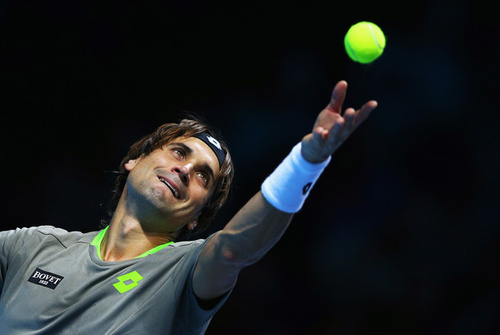Don't miss any stories → Follow Tennis View
FollowDavid Ferrer Hopes to Move Out of the Shadows
David Ferrer is as consistent as can be, both with his wins and his losses. Ferrer is rarely upset by players he should beat. On the other hand, Ferrer rarely does well against the best of the best. His record against Juan Martin Del Potro, Tomas Berdych, and players in that range just below the very elite cannot be criticized. Even his head-to-head record against Andy Murray is solid. But when he faces Novak Djokovic, Rafael Nadal, or Roger Federer, Ferrer rarely scores an upset.
To be fair, few players can expect to defeat those three men. And, even though Ferrer is 0-14 against Federer, even though Ferrer is winless against Djokovic since Novak’s transformation in 2011, it is the matchup with Nadal that will continue to define Ferrer to many observers.

It sometimes feels like Nadal has been Spain’s No. 1 player and Ferrer the No. 2 for over eight years. While that has not actually been the case on several occasions in this span, it still feels that way late in 2013.
When Ferrer and Nadal meet each other, one of two things comes to mind. One train of thought leads to their lopsided head-to-head record (now 21-5 in Nadal’s favor) and focuses on Ferrer’s overall struggles against Nadal. The other train of thought leads to Ferrer’s two victories in majors when Nadal was not entirely healthy (2007 US Open and 2011 Australian Open) and labels Ferrer as Rafa’s “kryptonite.” Either way, though, the narrative is about the scrappy underdog taking on a goliath.
Ferrer has begun to swing things his way, though, at least a small amount. The two Spaniards have met six times this year, the first four of them on clay. After a dominant Nadal win in Acapulco, they faced each other in Masters 1000 matches in Madrid and Rome. Those two matches, more than anything else, should have given Ferrer and his fans hope that he has turned a corner.
Ferrer came out with an incredible gameplan, launching a relentless assault on Nadal’s backhand. He kept Rafa pinned in uncomfortable positions and opened up the court brilliantly when the opportunity arose. He could not win either match, losing in three sets both times, but the potential emerged.
Then came the Roland Garros final. Ferrer had his opportunities in a match that was more tightly contested than the final scoreline showed. Still, Ferrer went away from his Madrid and Rome gameplan and seemed cowed by the occasion, understandably for a player contesting his first major final.
This year must be considered an overall success from Ferrer. That breakthrough at Roland Garros highlighted a nine-final campaign. Still, he may be thinking about how much he has left on the table. He has lost seven straight finals, including two at Masters 1000 tournaments (Miami, Paris) and the aforementioned Roland Garros match. It may not be simply nerves, but Ferrer is still a bit uncomfortable on the biggest stages.
Ferrer has faced Nadal twice in the past two weeks. He beat the No. 1 Spaniard in the Paris semifinals last week, but he could not replicate that high level of play and lost easily in a round-robin match at the World Tour Finals in London. Still, Ferrer competed better overall against Nadal this year than he has in any year since 2004. In fact, he arguably has played better against all of his elite rivals this year.
The only question for Ferrer is how long he can keep up this level of performance. At the age fo 32, he cannot have too many years of elite play ahead of him, especially with his physical style. But, if he can produce a 2014 campaign that recalls his effort in 2013, he may be able to keep his solid spot at world No. 3. He beat Nadal once this year. Perhaps next year he can halt his career-long drought against Federer.










